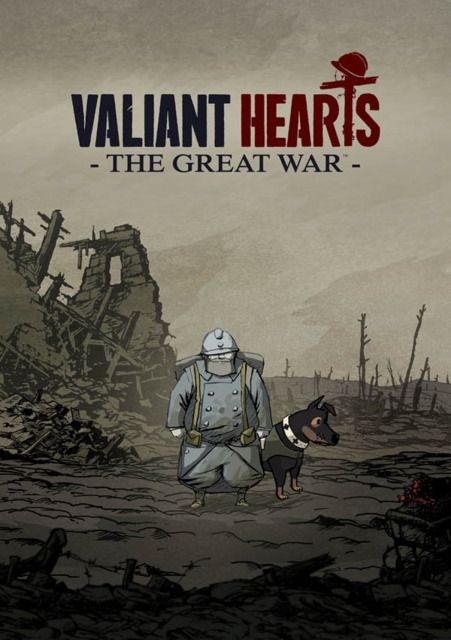Valiant Hearts: The Great War Review: The Follies of Men
To the minds at Ubisoft Montpellier, my heartstrings were just another tool to leverage their storytelling. Valiant Hearts: The Great War tests the loyalties of four main characters amid the first World War, selling the sadness and tragedy of human conflict in a more potent dose than history fans might expect. With cel-shaded visuals for good measure, Valiant Hearts remains a powerful advocate of the “games as art” argument throughout, though I wish the “game” part was slightly less, well, gamey.
Valiant Hearts is a 2D adventure title minus the pointing and clicking, and as the genre implies, the plot is extremely character driven. The French military drafts Emile, an aging farmer, mere days into the war. Worse, the government deports Emile’s son-in-law Karl back to Germany, where Karl, too, gets conscripted to fight. American-born Freddie is the wild card. While he often accompanies Emile on missions, Freddie swore revenge on the general that murdered his wife and will do anything to make that dream a reality. Anna, a veterinary student turned nurse, rounds out the cast, aiding the sick regardless of allegiance as she tries to locate her father.
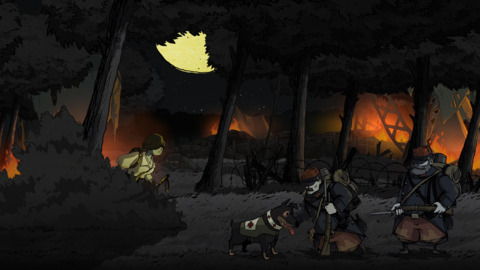
The fates of these friends become connected early on, but in spite of their separate upbringings, Emile and company just want the bloodshed to end, to see their beloveds again. War, however, is seldom so kind. Ubisoft puts players in the heart of the trenches during artillery storms, machine gun barrages, and chlorine gas attacks, and survival requires an active mind ‒ whether I rigged dynamite to detonate a bridge, pulled victims from burning rubble, or dug tunnels to rescue suffocating miners. The obstacles remain relevant to the situation and the subject matter, though puzzles rarely require cat-like reflexes. Bombs warn of their impact with ominous shadows, signs reveal cave-ins and land mines, and so on. The mechanics were never to blame for my mistakes ‒ the mark of any good adventure game.
In the more spacious levels, the developers present solutions as pseudo-checklists. While trying to escape a prisoner of war camp, I fulfilled favors for other survivors, repairing water valves, retrieving tobacco pipes, or finding medkits, though not necessarily in that order. The creators allowed me to breathe and proceed at my own pace, meaning I could savor the world they have reverently crafted. On the UbiArt engine ‒ the same software that powers Rayman and Child of Light ‒ Valiant Hearts prevails as a dichotomous beauty, equally inviting and horrendous. The green pastures and sunny skies of rural France give way to poisonous clouds and ailing infantry, bandaged and bloodied, yet I continued on, searching for war diaries and collectible history lessons.
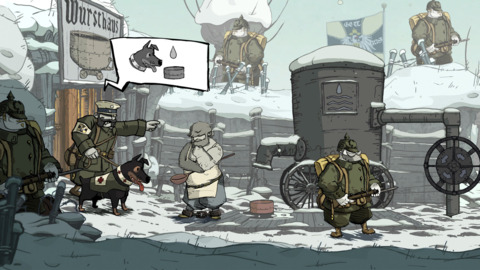
The narrative carries Emile and friends across Europe, from Ypres to Douaumont. While there, players uncover trinkets such as money, flasks, cards, or notes to relatives back home. They contain honest facts about civilian life and explain, in detail, why people on the Fronts were not the only innocents suffering. Women worked in factories to resupply their nation’s troops, and children perished in air raids alongside adults. I still recall several photographs, too ‒ the hollow stares behind men’s eyes, their bodies caked in grime, forced to wear rags soaked in urine to counter the effects of chlorine gas. The developers utilize real-life images sparingly, but they leave their mark.
When the gameplay and cruelties of war start to mix, however, the results take a toll on the tone. When I died redirecting the flow of a furnace spewing toxic fumes, the game reset me a few meters away, no harm done. My brothers in arms were not so lucky. I overpowered Baron Von Dorf thanks to a broken pipe organ, too, and patched up Karl after retrieving him from a ruined zeppelin, from a crash that would have killed any NPC. Everything (mostly) works out for the characters because the writing calls for it, which undercuts the authenticity.
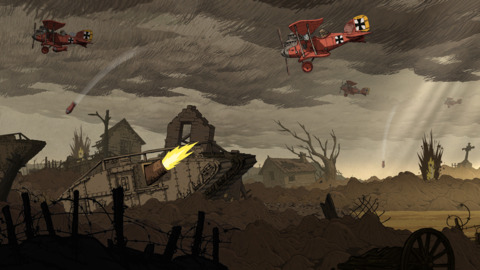
The cartoon aesthetic dilutes the graphic nature of the hardships people endured, but wacky driving sequences eroded my pity as well. Enemies pursue your car in bombers and tanks while you evade fences and traffic to overtures like Jacques Offenbach’s “Infernal Galop,” contradicting the story’s "war is hell" message. Am I racing to the battlefield to save soldiers on the verge of death, or am I rehearsing my can-can routine? It was impossible for me to enjoy these chapters, just like Anna’s healing minigame, where I applied anesthesia, set broken bones, or amputated victims’ limbs to the rhythms of Guitar Hero: EKG Edition.
The gamey-ness aspect is also made worse by the villain. The developers put a face to the German enemy ‒ the previously named Baron Von Dorf ‒ as if they thought the senseless violence could not speak for itself. He, supposedly, represents the evils one often encounters in times of chaos, yet the memories of Von Dorf standing on a dinner table, singing and demanding you fry up more bratwurst paint him as a Looney Tunes caricature. Von Dorf? More like Von Doof.
Thankfully, Ubisoft Montpellier did not give Von Dorf a speaking role. Besides a narrator who would be at home in dramas and documentaries, only Emile gets the voice over treatment. His notes to his daughter weep with hopelessness that come from years of expert acting ... or depression ‒ trust me on that one. I believed in Emile’s actions, including ones that could have him court-martialed. His final speech inspires anger and empathy, despite characters muttering simple thank yous and cries for help amid actual gameplay. “War makes men mad,” he says. Indeed.
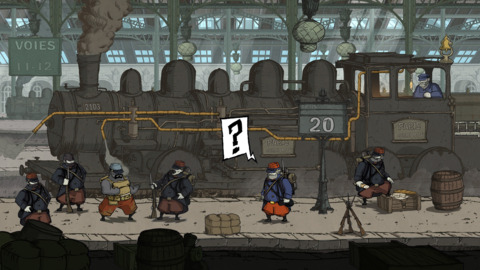
Valiant Hearts’ ultimate sin is teasing a story less emotional than the one it delivers. The puzzle stuff is a bit basic but never offensive, yet I should have been emptying tissue boxes and bawling my eyes out, watching Emile, Freddie, Karl, and Anna fight on for their families and countries. Studios seldom embrace the follies of old fools like Ubisoft Montpellier does here. World War I became a messy stalemate ruled by trench warfare and industrial failures, and thousands of good men gave their lives in the name of peace.
Likewise, the graphics illustrate a huge 180 from the vibrancy of Rayman, but conflicts with Valiant Hearts’ art and dorky antagonist burden the plot with baggage it did not need. The narrative grows into something heartfelt by the fourth and final act, and from the dialogue to the characterization, it is the strongest objectively. Had Ubisoft given players more of the opening and conclusion, Valiant Hearts: The Great War might have moved me to tears, when all I could muster were a few heavy sighs and a knot in my throat.
Written for WikiGameGuides.com. Like the review? Follow me on Twitter.
